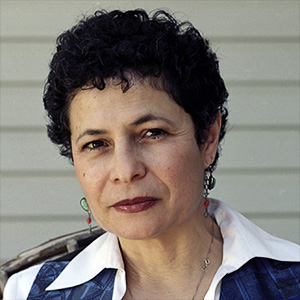Scholars, musicians, writers, and artists Alma Martinez, Helena MarÃa Viramontes, Martha Gonzalez, and Cándida Jáquez join to create an evening peña. A peña is most broadly conceived as a community gathering through the arts that often relates to social justice issues. These women bring spoken word, music, and dance from feminist perspectives that define and critically reflect intersectional struggles across race, class, and sexuality. These feministas present their work as an open dialogue across multiple communities. Each addresses power relations in how she creates art and scholarship to shape social and cultural debates within those communities. Please join us as they bring their collective knowledge and artistry to the stage.
 Cándida Jáquez is an associate professor and ethnomusicologist in the Music Department at Scripps College. Her research has focused on Latino popular and Mexican traditional music with a specialty in women’s mariachi performance across the complexities of performativity, ethnographic research, race, class, and gender.
Cándida Jáquez is an associate professor and ethnomusicologist in the Music Department at Scripps College. Her research has focused on Latino popular and Mexican traditional music with a specialty in women’s mariachi performance across the complexities of performativity, ethnographic research, race, class, and gender.
She is the co-editor, with Frances Aparicio, of Musical Migrations: Transnationalism and Cultural Hybridity in Latin/o America, Volume I. Her work also appears in such collections as Chicana Traditions: Continuity and Change (Norma Cantú; Olga Nájera-RamÃrez, eds.). She is currently completing a book manuscript concerning mariachi performance in North America.
In addition to research in Latino music, Cándida is pursuing a multi-year study of indigenous music and dance surrounding the iconic figure of La Virgen de Guadalupe in feast day celebrations at the Mexico City Basilica. She has previously held teaching positions at Indiana University at Bloomington, Arizona State University at Tempe, and visiting positions at Xiamen University, PRC, and California State University Fresno. Her teaching interests have included developing “Rhythm and the Latina Body Politic,” a course focused on Latinidad through women’s bodies in Latino popular music. She has given multiple invited lectures and paper presentations in the U.S., Canada, Mexico, Scotland, and Germany.
A former vice president of the Board of Directors for the Arte Américas Museum, Cándida remains an active member of the Chicana community in promoting the arts and education for under-represented groups. She can also be found on stage from time to time as a violinist and singer in the mariachi tradition.
Martha Gonzalez was born and raised in East Los Angeles and is a Chicana artivista (artist/activist), feminist music theorist, and academic.
Her academic interest in music has been fueled by her own musicianship as a singer and percussionist for East L.A’s Quetzal for the last 17 years. Quetzal has made considerable impact in the Los Angeles Chicano music scene. The unique blend of East Los Angeles sounds as well as the social justice content in the work has sparked dialogue and theoretical work among various artist communities, culture theorists, and scholars across the country, Mexico and Japan. The relevance of Quetzal’s work has been noted in a range of publications from dissertations to scholarly books, most recently Patricia Zavella’s I’m Neither Here Nor There: Mexicans’ Quotidian Struggles with Migration and Poverty (Duke University Press, 2011). As a result, the U.S. Library of Congress and Kennedy Center extended an invitation to perform and speak in September of 2011 as a part of their “Homegrown” music series. In addition, the traveling exhibit “American Sabor: Latinos in U.S. Popular Music,” sponsored by the Smithsonian Institute, featured Quetzal as leaders and innovators of Chicano music. This feat, coupled with a Grammy Award for Quetzal’s May 2012 album, “Imaginaries,” (released on the Smithsonian Folkways label), marks the importance of her past and ongoing work.
As a musician, Gonzalez has collaborated and/or toured with artists such as Los Lobos, Los Van Van, Jackson Brown, Susana Baca, Perla Batalla, Jaguares, Ozomatli, Jonathan Richman, Los Muñequitos de Matanzas, ¡Cubanismo!, Taj Mahal, Tom Waits, Los Super Seven, Lila Downs, Raul Malo, Rick Treviño, Son De Madera, Relicario, Chuchumbe Charanga Cakewalk, The B-side Players, Teatro Campesino, and Laura Rebolloso. In these ways, music pedagogy and transnational music movement experience have influenced Gonzalez’s scholarship.
Alma Martinez holds a doctorate in drama from Stanford University and a master’s of fine arts in acting from USC. She attended the Centro Universitario de Teatro at the National University of Mexico, the Royal Academy of Dramatic Art and studied with Lee Strasberg, Jerzi Grotowski, Arianna Mnouchkine, and Anna Deveare Smith. In 2010 she initiated a production of Zoot Suit with the National Theatre Company of Mexico in Mexico City and served as U.S.-Mexico project coordinator. In 2011 the Association of Theatre Journalists in Mexico City awarded the play “Best Musical,” the first such award for a non-Mexican play.
A Fulbright scholar, Alma’s research focuses on Chicano and Latin American political theatre between 1965-1976. Her most recent article, “Pancho Villa’s Head: Mexico and the Chicano Dramatic Imagination,” in Open Borders to a Revolution: Culture, Politics, and Migration (Smithsonian Scholarly Press) was published in May 2013.
Alma holds the distinction of being the first Latina/o PhD to be inducted into the Academy of Motion Picture Arts and Sciences, Actors’ Branch and the Academy of Television Arts and Sciences, Actors’ Peer Group.
Helena MarÃa Viramontes is the author of Their Dogs Came with Them, a novel, and two previous works of fiction, The Moths and Other Stories and Under the Feet of Jesus, a novel. Named a USA Ford Fellow in Literature for 2007 by United States Artists, she has also received the John Dos Passos Prize for Literature, a Sundance Institute Fellowship, a National Endowment for the Arts Fellowship, the Luis Leal Award, and a Spirit Award from the California Latino Legislative Caucus. Viramontes is currently professor of creative writing in the Department of English at Cornell University in Ithaca, New York, where she is at work on a new novel.
Watch


 Martha Gonzalez was born and raised in East Los Angeles and is a Chicana artivista (artist/activist), feminist music theorist, and academic.
Martha Gonzalez was born and raised in East Los Angeles and is a Chicana artivista (artist/activist), feminist music theorist, and academic. Alma Martinez holds a doctorate in drama from Stanford University and a master’s of fine arts in acting from USC. She attended the Centro Universitario de Teatro at the National University of Mexico, the Royal Academy of Dramatic Art and studied with Lee Strasberg, Jerzi Grotowski, Arianna Mnouchkine, and Anna Deveare Smith. In 2010 she initiated a production of Zoot Suit with the National Theatre Company of Mexico in Mexico City and served as U.S.-Mexico project coordinator. In 2011 the Association of Theatre Journalists in Mexico City awarded the play “Best Musical,” the first such award for a non-Mexican play.
Alma Martinez holds a doctorate in drama from Stanford University and a master’s of fine arts in acting from USC. She attended the Centro Universitario de Teatro at the National University of Mexico, the Royal Academy of Dramatic Art and studied with Lee Strasberg, Jerzi Grotowski, Arianna Mnouchkine, and Anna Deveare Smith. In 2010 she initiated a production of Zoot Suit with the National Theatre Company of Mexico in Mexico City and served as U.S.-Mexico project coordinator. In 2011 the Association of Theatre Journalists in Mexico City awarded the play “Best Musical,” the first such award for a non-Mexican play. Helena MarÃa Viramontes is the author of Their Dogs Came with Them, a novel, and two previous works of fiction, The Moths and Other Stories and Under the Feet of Jesus, a novel. Named a USA Ford Fellow in Literature for 2007 by United States Artists, she has also received the John Dos Passos Prize for Literature, a Sundance Institute Fellowship, a National Endowment for the Arts Fellowship, the Luis Leal Award, and a Spirit Award from the California Latino Legislative Caucus. Viramontes is currently professor of creative writing in the Department of English at Cornell University in Ithaca, New York, where she is at work on a new novel.
Helena MarÃa Viramontes is the author of Their Dogs Came with Them, a novel, and two previous works of fiction, The Moths and Other Stories and Under the Feet of Jesus, a novel. Named a USA Ford Fellow in Literature for 2007 by United States Artists, she has also received the John Dos Passos Prize for Literature, a Sundance Institute Fellowship, a National Endowment for the Arts Fellowship, the Luis Leal Award, and a Spirit Award from the California Latino Legislative Caucus. Viramontes is currently professor of creative writing in the Department of English at Cornell University in Ithaca, New York, where she is at work on a new novel.